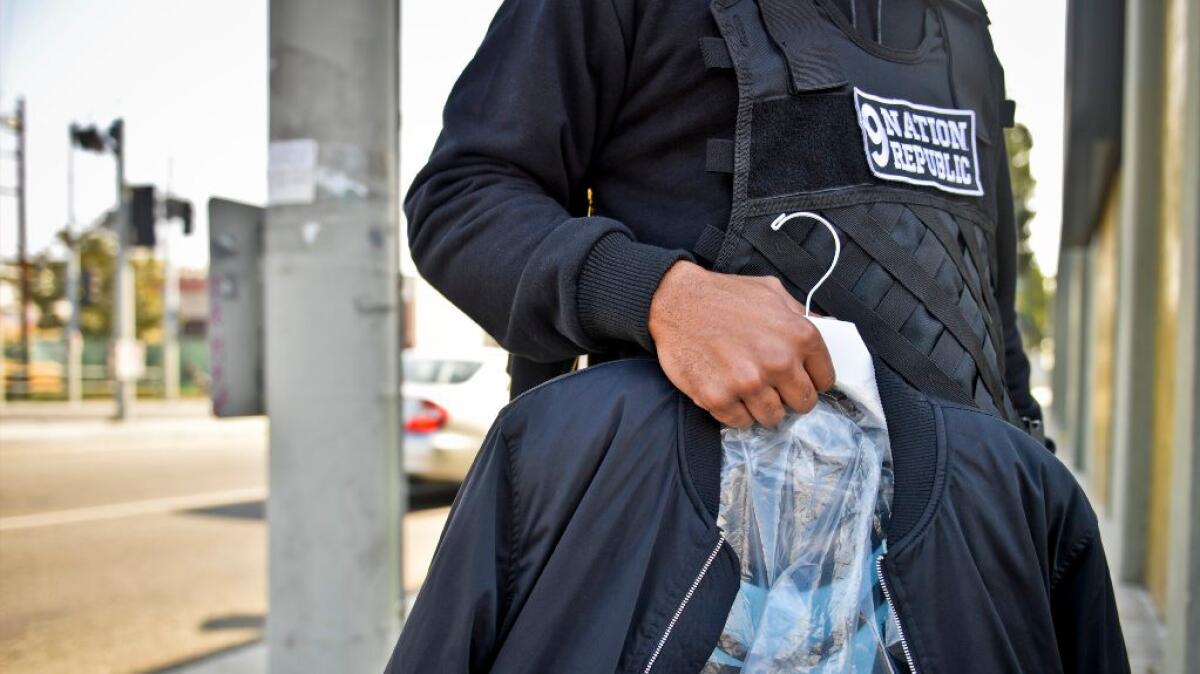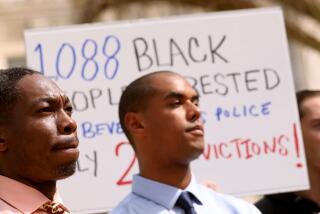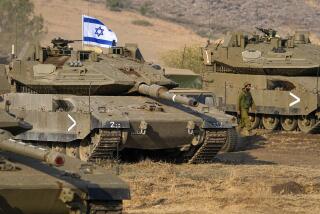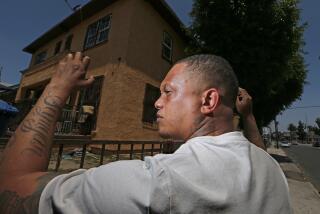L.A. entrepreneur hopes to make body armor a hot fashion item

The way Michael Jones tells it, the Los Angeles Police Department patrol cars rolled up on him and a few friends as they stood on a downtown street corner one morning, shooting promo videos for his new line of streetwear.
This would have made him nervous in any case, he says. He’s 30 years old and African American, after all — attributes known to trigger racial profiling.
It was more than that, though. The date was July 8, the day after a sniper wearing body armor shot and killed five Dallas police officers and wounded seven others.
And Jones’ fashion items, khaki and denim vests with optional hoodies, are bullet-resistant.
I’ve done a lot of research, and I believe there is a growing market for these sorts of things.
— Michael Jones, designer
“The officers, with guns drawn, told us to get down on the ground,” says Jones, who also works as a security guard. “After about 15 minutes, they put me a car and one of the officers started asking questions like, ‘Why are you wearing body armor?’ ”
“I told him it was part of my fashion line,” Jones says. “He said, ‘Why would you want to wear a vest like this — fashion or not — at a time like this?’ ”
That officer, Jones says, missed the point.
His fashion line was inspired by growing anguish over “police shootings of blacks, police shot in the line of duty and terrorist attacks from San Bernardino to Paris, France,” Jones says. “Every time you turn on the news, what do you see? Another person got shot somewhere.
“So, these vests are intended to serve as protection,” he says, “and to make this fashion statement: We’ve got to do something about all this violence.”
Incidents such as the North Hollywood shootout in 1997 — during which 12 police officers were wounded in a prolonged gun battle with two heavily armed bank robbers wearing home made body armor — have periodically stirred questions about civilian access to gear designed for protection during combat.
The suspect accused of shooting and killing two Palm Springs police officers responding to a domestic dispute last Saturday was a convicted felon, and so could not have legally purchased the body armor he wore during the suspected ambush.
But to date there are few restrictions nationwide on the purchase of such clothing — although Rep. Michael Honda (D-San Jose) has introduced legislation to prohibit the sale to most civilians of “enhanced body armor” designed to stop high-caliber bullets. It was supported by the California State Sheriff’s Assn. but never came up for a vote.
Darnell Hunt, a professor of sociology and director of the Ralph J. Bunche Center for African American Studies at UCLA, says that the idea of a body armor fashion line resonates with this moment of intense scrutiny on police shootings of black people nationwide and with history.
“Conventional wisdom for generations in the African American community is to be fearful of police, and don’t expect them to protect and serve us,” Hunt says. “So, it’s not irrational.”
Hunt also sees a possible connection between Jones’ aspirations and the new Netflix series “Luke Cage,” which features a black superhero with bullet-proof skin who steps in to defend his Harlem neighborhood from bad guys on both sides of the law.
“The makers of Luke Cage are trying to tap into the national debate over the vulnerability of black bodies to police bullets,” he says. “This entrepreneur is making a similar point: We don’t want to be victims of police overzealousness.”
Emblazoned with the brand name 9Nation Republic — slogan: “Is this what it’s come to?”—the vests range in price from $250 to up to $2,000 for designs that include ceramic plates to protect against high-powered handguns.
So far, Jones has sold three of the vests, all to an African-American customer in Texas.
“I’m still working on an advertising campaign,” Jones says. “But I’ve done a lot of research, and I believe there is a growing market for these sorts of things.”
Jones is not the first person to try to tap into a civilian market for body armor.
In Bogotá, Colombia, for example, tailor Miguel Caballero, aka “The Armored Armani,” has for years specialized in custom, bullet-proof clothing for VIPs who, as he likes to say, “have a reasonable possibility of getting shot.”
Jones, however, says he is focused on “a potential market of average people” who worry about violence and suspect that “having to wear items like these could become a normal part of daily life.”
ALSO
Men charged with felony assault and hate crimes in beating of Bay Area Sikh man
Malibu security guard shoots home intruder after being stabbed in eye
O.C. man sentenced to life in prison for killing parents in 2014
More to Read
Start your day right
Sign up for Essential California for news, features and recommendations from the L.A. Times and beyond in your inbox six days a week.
You may occasionally receive promotional content from the Los Angeles Times.







